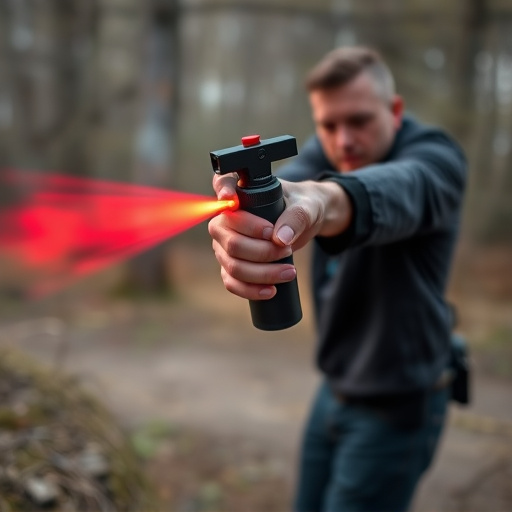The effectiveness of pepper spray varies greatly across different climates due to temperature and humidity levels. Warmer conditions can reduce its potency, while colder climates may maintain strength but decrease spray range. High humidity prolongs effects, while dry weather requires more precise application. Choosing pepper spray designed for consistent performance in diverse weather patterns is essential for optimal self-defense. Staying informed about local laws regarding pepper spray usage and regulations further enhances personal safety.
“Uncover the power of pepper spray as a vital self-defense tool in our comprehensive guide. Explore its effectiveness against various threats, especially in different climates—a crucial factor in its performance. Learn how environmental conditions can impact its potency and why choosing the right type is essential for optimal protection. Delve into safety considerations and legal aspects to ensure responsible usage. With an emphasis on pepper spray’s role in personal security, this article provides insights for those seeking effective defense options.”
- Understanding Pepper Spray: How Effective is it as a Defense Tool?
- The Impact of Climate on Pepper Spray Performance
- Choosing the Right Pepper Spray for Different Environmental Conditions
- Safety Considerations and Legal Aspects of Carrying Pepper Spray
Understanding Pepper Spray: How Effective is it as a Defense Tool?
Pepper spray has long been recognized as a potent defense tool against assault, but its effectiveness varies based on several factors, including different climates. In essence, pepper spray works by causing temporary blindness and respiratory distress in the attacker, giving the victim precious time to escape or defend themselves. The active ingredient, capsaicin, irritates the eyes and nasal membranes, leading to these debilitating effects.
However, when it comes to its effectiveness across various environments, pepper spray’s performance can be influenced by temperature and humidity levels. In hot and humid climates, pepper spray may dry out faster, potentially reducing its potency. Conversely, in colder conditions, the spray can remain more potent but might spread more slowly due to lower temperatures, affecting its range of impact. Understanding these nuances is crucial for users to make informed decisions about their personal safety and choose the right defense tool suited for different climates.
The Impact of Climate on Pepper Spray Performance
The performance and effectiveness of pepper spray can be significantly influenced by environmental factors, particularly climate. In warmer climates, pepper spray retains its potency, as heat doesn’t typically impact its chemical composition. However, in colder regions, the story can change. Pepper spray consists of oleoresin capsicum (OC), a natural compound that irritates the eyes and respiratory system. When exposed to freezing temperatures, OC can solidify, altering the spray’s consistency and potentially reducing its reach and impact. This is why users in colder climates might notice a difference in effectiveness compared to warmer environments.
Additionally, humidity plays a role. High humidity levels can cause pepper spray to evaporate more slowly, allowing for a longer-lasting effect on the target. In contrast, dry conditions might result in faster evaporation, requiring users to aim and apply the spray more precisely to achieve the desired outcome. Understanding these climate-related factors is crucial for individuals considering pepper spray as a self-defense tool, ensuring its optimal performance in various weather conditions.
Choosing the Right Pepper Spray for Different Environmental Conditions
When selecting pepper spray for self-defense, understanding its effectiveness in different climates and environmental conditions is essential. Pepper spray performance can vary greatly based on temperature and humidity levels. In colder climates, where the air is dry, pepper spray remains highly effective as it creates a potent aerosol that can quickly incapacitate an assailant. However, in warmer, more humid environments, the spray’s concentration and range may be reduced due to evaporation, making it less effective at long distances or in close quarters.
For regions with diverse weather patterns, choosing a pepper spray designed for versatility is crucial. Look for products that have been tested in various conditions, offering consistent performance across different temperatures. Some advanced sprays include features like weather-resistant canisters and improved formulations to maintain their potency even in moist or high-humidity settings. These considerations ensure that you have a reliable defense tool, regardless of the environmental challenges encountered during an emergency situation.
Safety Considerations and Legal Aspects of Carrying Pepper Spray
When considering pepper spray as a personal defense tool, it’s crucial to weigh its effectiveness against various environmental factors and legal constraints. Pepper spray is known for its immediate impact in neutralizing an assailant by temporarily blinding and distracting them, allowing users to escape or seek help. However, its performance can be influenced by different climates; extreme cold or hot temperatures may reduce its potency, as chemical reactions are affected. Moist environments can also diminish its range and intensity, impacting the user’s ability to deploy it effectively during an attack.
From a legal standpoint, regulations regarding pepper spray vary significantly across jurisdictions. Some areas permit its use only by law enforcement or trained individuals, while others allow civilians to carry them for self-defense purposes. Users must be aware of local laws and obtain any necessary permits or licenses to legally possess and use pepper spray. It’s essential to stay informed about restrictions related to age limits, quantity allowances, and storage requirements to ensure compliance and maintain personal safety.
In conclusion, pepper spray can be an effective defense tool against assaults when used appropriately. Understanding its effectiveness in different climates and choosing the right type for your environment is key. However, safety considerations and legal aspects must also be taken into account to ensure responsible use. By being informed about these factors, individuals can make informed decisions regarding self-defense options, enhancing their personal security.
